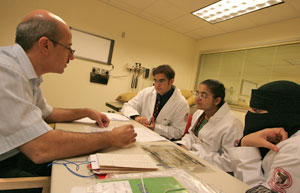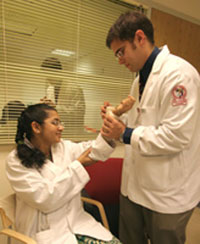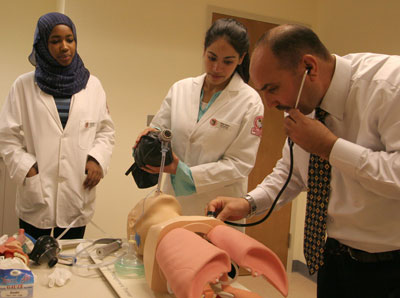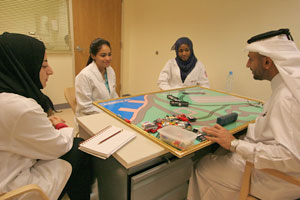Medical Students learn emergency skills

Held in the Clinical Skills Center, the course gave
students an overview of the work of the
emergency services....
First year medical students completed the first responder course, organized as part of Medicine, Patients and Society I (MPS I) and conducted late September by experts from Hamad Medical Corporation (HMC).
The Fundamentals of Immediate Responder Support Training Course (FIRST) included five practical 30-minute workstations in the newly refurbished Clinical Skills Centre at WCMC-Q, and a series of lectures by HMC's Head of Emergency Medical Services, Dr. Abdul Wahab Al Musleh.
The six-member team from HMC, headed by Dr. Al Musleh, took the lead as instructors in the workstations and instructed the students in a range of skills including disaster management and performing triage.
MPS I course director Wendy Terry, M.D., said the first responder course covered the basic patient care principles that are central to medical practice and useful in any patient encounter, as well as basic lifesaving practices that are used prior to the arrival of emergency services.

....practice in the basics of treating the injured....
"Students learn how to initially approach a sick or injured patient, basic airway, basic wound management, immobilization in trauma, and how to respond to common medical scenarios," she explained.
Student Manisha Deb Roy said that the practical hands-on experience was very different from learning theory. "We get to practice using the machines and equipment, and we practice on each other, which is really helpful. After you've done it once, it's easier to remember. "
"We see all these things in ER shows, but now we're actually doing them — so it's pretty cool."
She also noted that the sessions were building on skills that were imparted to class members in a previous course during their pre-medical education: “Two years ago, we did some training in basic life support. This time, we've learnt more, like triage, disaster management and defibrillation."
Performing triage was the toughest aspect of the course for most of the students. Imran Farooq gave his perspective: “It was hard ethically because you have to decide which patients to save and who not to save,” he said. "There aren't enough resources to save everyone."

....and instruction in responding to common medical scenarios

Dr. Al Musleh explains disaster management
